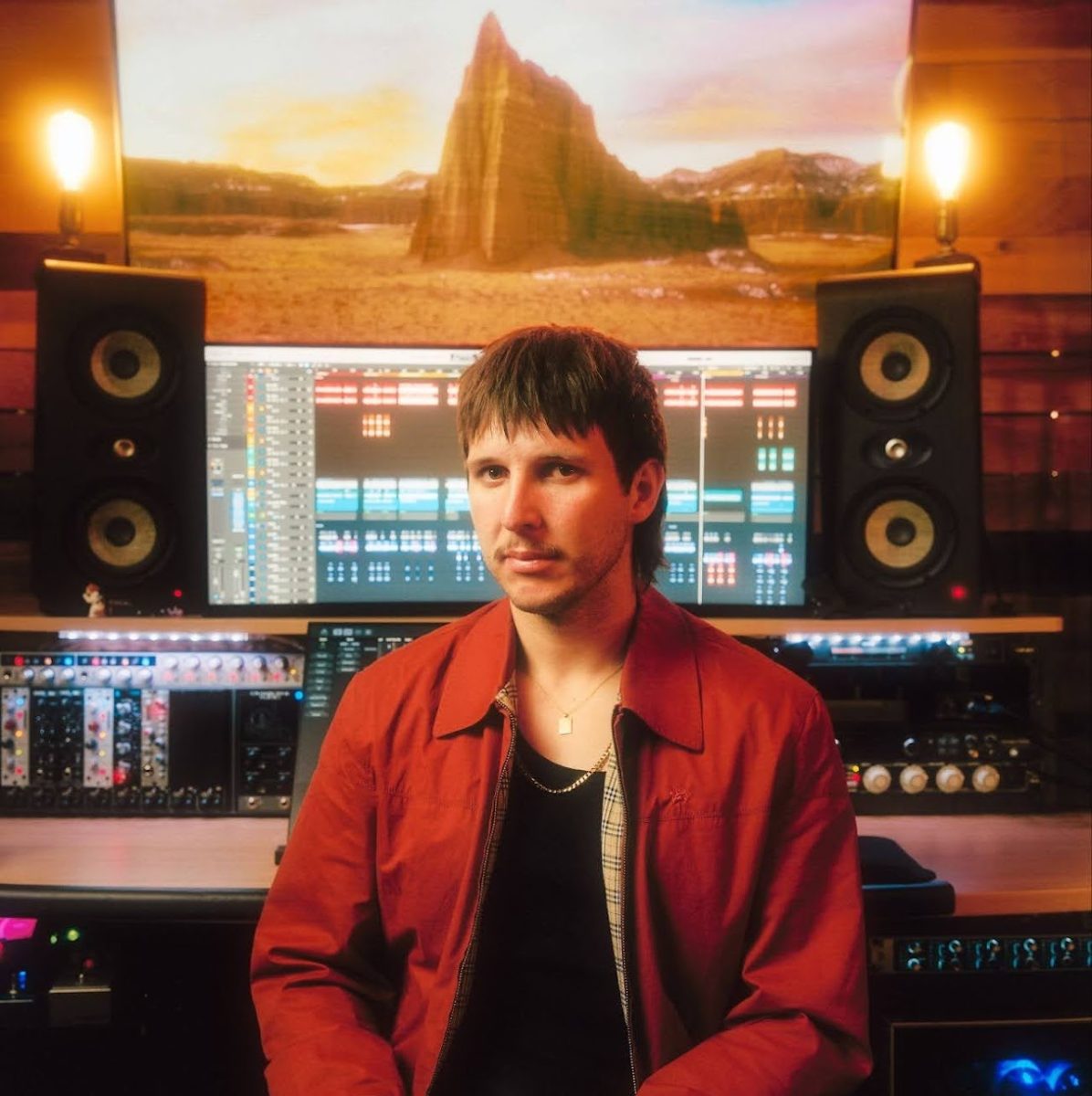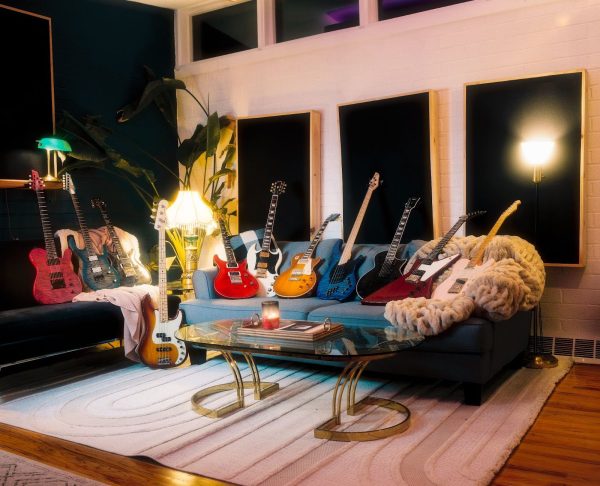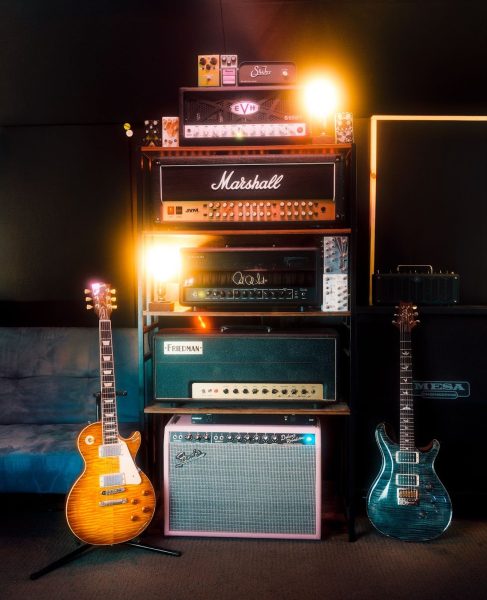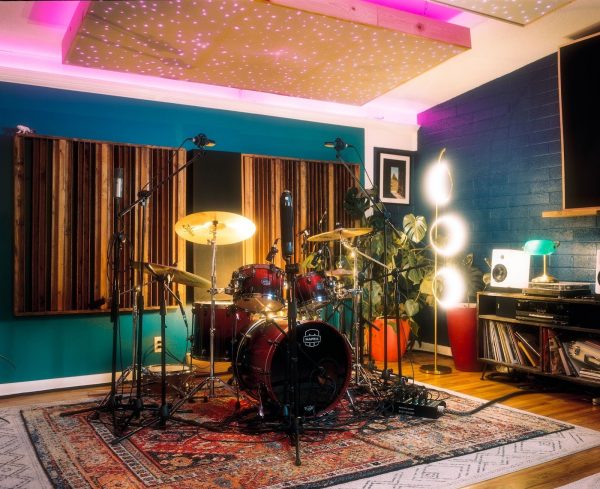Local Salt Lake City audio engineer Flip Twogood started recording out of necessity. His band, Acacia Ridge, had gone to a studio and spent $2,000 to record four songs. When they got the songs back, they were disappointed with what they heard.
“They just weren’t super great. And I thought that I could at least do what this guy did. I think I could figure that out,” Twogood said.
He started working for rideshare apps on top of his day job and made a deal with his wife to spend the extra income on studio gear. After building his collection of equipment, he began to record his band’s music and sent the initial recordings to Germany-based studio Überlärm Studios for mixing and mastering.
“When I got it back, we were just blown away at how good it came out and I was literally in tears,” he said. “It was like, ‘oh my gosh, like, I’m going to be famous.’”
Within the first three weeks on Spotify, the song got 100,000 streams, warranting Twogood to record the rest of the album and release it as well. Six years later, the album, titled “Watch Your Monarchs Fall,” has 5 million streams on Spotify. Consequently, Twogood’s work started attracting him more opportunities.
“People started asking me, ‘Who recorded your band?’ And I told them that I did it and then they asked me if I’d be down to record them.”
Over the next two years, Twogood started to record other bands and focused on learning and gaining experience. “It got to a point where it just grew a lot and I was booked out months in advance. I had the opportunity to quit my job and I took that.”
Recording Process
When Twogood initially starts to work with a band, he focuses on collaboration and getting to know them. “We’ll go over what their vision is, what bands they listen to, what songs they like, what guitar tones they like, and from there, I’ll have them show me an example or two of what they’re trying to get at and then, I’ll just go to work,” he said.
This part of the process is common with most audio engineers. They ask artists what their influences are and any references to other sounds that they want to incorporate into the session. This ensures that both the engineer and artist are on the same page before recording starts. After agreeing on a vision for the recording session, Twogood starts by deciding which guitar amp will sound best and tracking those in. He edits the guitar, and moves onto bass, drums, and finally vocals, although his favorite part of the process is what comes after.
“When the bands are down to spend a little extra time on their song after we’ve recorded everything that they’ve written, I’ll go in and I’ll spice it up by adding like, extra synths, strings, orchestration, shakers, percussion, just what I like to call ear candy,” he said.
Twogood says that this is what separates songs in the professional competition. These post-production additions are what make the song sound like it was expensive to produce and bring the track into comparison with the bands that are popular enough to make it as full-time musicians. After the studio session, Twogood is left alone with the tracks to work on mixing and mastering. However, he tends to leave the tracks alone for about two weeks before touching them.
“I really like having that time away from the song to just let it settle. I come back to it with fresh ears.”
After that, he goes back and forth with the band, performing final revisions until they are happy with what they hear. Currently, Twogood’s favorite equipment that he has been using is a distressor compressor that he uses to compress vocals on their way in. He refers to this as the “absolute hack” to making vocals sound better.
Acacia Ridge
Twogood’s heavy metal band, Acacia Ridge, has been navigating the local music scene for seven years now. He started off thinking that if he went all in on the band, then it would work out in about five years. He found out quickly that this wasn’t the case.
“I mean, things have worked out for us pretty well, but it’s not like it’s providing a living or anything for us,” he said.
While the band has slowed down for the time being, Twogood feels confident in the band’s growth over the years and what they will be able to accomplish in the future. On May 1, they played their biggest show yet, opening for Daughtry at local music venue The Complex for an audience of thousands. Twogood attributes this opportunity to just being in the scene for a while.
“Something that I truly believe is, as long as you just stick with something and you keep showing up and doing it, eventually it’s going to work out,” he said. “Or at least eventually it’s going to continue to grow and just get bigger and better and more and more opportunities.”
Acacia Ridge also just released their latest album, “The Deviant Era,” which they had been working on for three years. While Twogood acknowledges that the album took too long to write, the extra time gave the band the opportunity to see their growth. More than that, it allowed them to hit the ground running on their next album, which they will start writing in September this year.
“We’ve got a lot of really good ideas, and I think we’ve all developed musically an insane amount, where this new album should be something that is our greatest work so far. Which is what everyone says, but I truly believe it,” he said. “It took a long time to learn what we’ve learned, but I think we’ve all grown as songwriters and musicians and we’re really looking forward to that.”
Why choose Aggressive Audio?
At risk of coming off too arrogant, Twogood maintains what sets him apart from other audio engineers: he genuinely cares throughout the entire process.
“When I am working with the band, I will share with you everything that I know,” he said. “From marketing your song to getting it on Spotify editorial playlist, to how to get bigger and better shows, how to get people to listen to your songs, what it takes to get on the Spotify algorithms and how you can do that. I just want my bands to succeed.”
Twogood says that one of his main goals is for the band to recoup what they spent on the recording sessions through streams, shows and merch. He wants his bands to become self-sufficient so that they can continue pursuing what they love.
“To be able to make that money back, because you really can make money back in music,” Twogood said. “It is hard, absolutely. It’s super hard. But it is 100% doable.”
Twogood’s advice
First on Twogood’s list of advice for newer audio engineers: “Do not, under any circumstances, go to college for it.” While it might seem that the best place to learn a new skill is at a school, Twogood believes that audio engineers should be focused on building their skills on their own for a couple of reasons.
One, he feels that the majority of the people who are teaching audio engineering in schools are out of touch.
“They’re not putting out banger records right now. They’re doing that because they learned the skill and yes, they can do it, but they’re teaching it instead of producing full time,” he said.
Secondly, Twogood wants newer audio engineers to know that the internet can be a better tool for learning audio engineering than a school.
“There’s nothing that they’re teaching you that you can’t learn online with YouTube and other online courses,” he said.
Additionally, opting out of going to college can save new audio engineers money and time that can then be spent on building experience and a collection of recording equipment.
“From my experience in the industry, there’s not a single studio or person who’s going to hire you because you got a degree,” Twogood said. “They’re going to hire you because of your portfolio, because of your website and like the work that you’ve done and showing proof that you’re good at it.”
Despite Twogood’s success in the audio engineering world, he still feels that he doesn’t belong.
“Hardest part of being an audio engineer is probably the impostor syndrome,” he said. “All of these things and always feeling like, ‘damn, I’m not very good at this and I need to be better,’ which I do think is important. If you feel like you’re amazing, you’ve probably got work to do.”
Twogood overanalyzes all of his work, constantly trying to find ways to improve. This commitment to quality is what allows him to constantly improve, but at times, it also exposes him to intense self-criticism. When he finds himself being overly-critical of himself, he reflects on his progress as a musician and audio engineer.
“Even just like three months ago, what I’m doing now is better than I was three months ago and as long as you just keep always wanting to improve and never being content with the level you’re at, I think you’re in good shape.”
One final piece of advice from Twogood is to stop whatever you’re doing and go listen to “You Don’t Want It Bad Enough” by Nic D.
“In summary, it’s just if you really want something bad enough, you’re going to do everything it takes to get there. And I did that with audio,” Twogood said. “I was working 80 hours a week for four years straight, in order to make this dream happen.”








